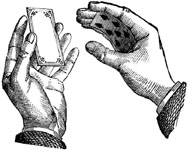
The Invisible Man
HARVARD DIARY
For many years I have taught Ralph Ellison’s Invisible Man to college students, and each time I discuss the book I find myself yet again the grateful reader who is both entertained and instructed. The novel was published in 1952, when I was just starting medical school and had little time for reading on the side. I did have a few minutes, now and then, to converse with my parents, both avid fans of fiction, and I well remember Mom recommending the Ellison novel to me in the course of a hurried phone conversation. I promptly put her suggestion out of mind, however. I had long biological lists to memorize, if I was to be a physician, and my interest in such study could never be taken for granted, to say the least — so I had to give what time I had to those textbooks, given my low level of “efficiency,” a matter of boredom doing its undermining work. My mother kept trying though — her apparently casual asides and suggestions a legendary part of our family’s life: We knew how reluctant she was to abandon an idea in which she believed. But as her son I had learned my own, responsive stubbornness, and the long and short of it was that I turned a deaf ear to her prodding with respect to Invisible Man — until one day it arrived in the mail, with a long letter from my mother, which offered apologies for what got called “an intrusion,” but submitted, as well, a passionate plea for what she kept calling “a close look at our country.” That phrase was all Mom — a modest, unpretentious way of saying more than is at first apparent. This was, after all, a novel whose title told of invisibility, hence the blindness of others — and there she was, using a visual image in her appropriately casual advocacy.
I read the novel during the summer of 1953 — an occasional stolen hour while rotating through a clerkship in pediatrics, which even then I knew would be my chosen branch of medicine. I carried the book with me, actually, in my black doctor’s bag, full of those instruments which not only help a medical student examine patients but are a badge of honor: Here I am, headed there! One day, as I was examining a 10-year-old boy who had cystic fibrosis, and therefore poor prospects for an extended survival, I found myself emptying my bag, in search of my stethoscope, which had become entangled with other diagnostic devices in a limited space. As I did so, I pulled out the novel, and the boy wanted to know what it was. A story, I told him. About what? Borrowing from my mother: about America, a look at it. Oh — is the guy a shadow? I draw a blank — puzzle at the reference, take it literally, say no, a real man, even if a lot of people don’t consider him so and ignore him. I don’t want to go any further though — I have work to do, and I’m already behind schedule. But the boy won’t let up — he tells me about his dad’s favorite boyhood radio program, “The Shadow.” I smile. I tell the lad that I also used to listen to that program. For a second or two I’m forgetting about the novel, remembering “Lamont Cranston, man-about-town” and his girlfriend, “the lovely Margo Lane,” and remembering, as well, the creaky, creepy voice of “the Shadow,” and the mystery of it all: Cranston become invisible, and, in that form, morally knowing, and, yes, invincible — he could spot the crooks, take them by complete surprise, undo them.
You May Also Enjoy
The usual categories we summon to describe people, to explain their motives and purposes, can be rendered utterly inadequate by particular moments of crisis.
Girls in the ghetto are hungry for love, and desperately afraid of not going along with the social, cultural, and sexual pressures of the street.
Review of John LaFarge and the Limits of Catholic Interracialism, 1911-1963

